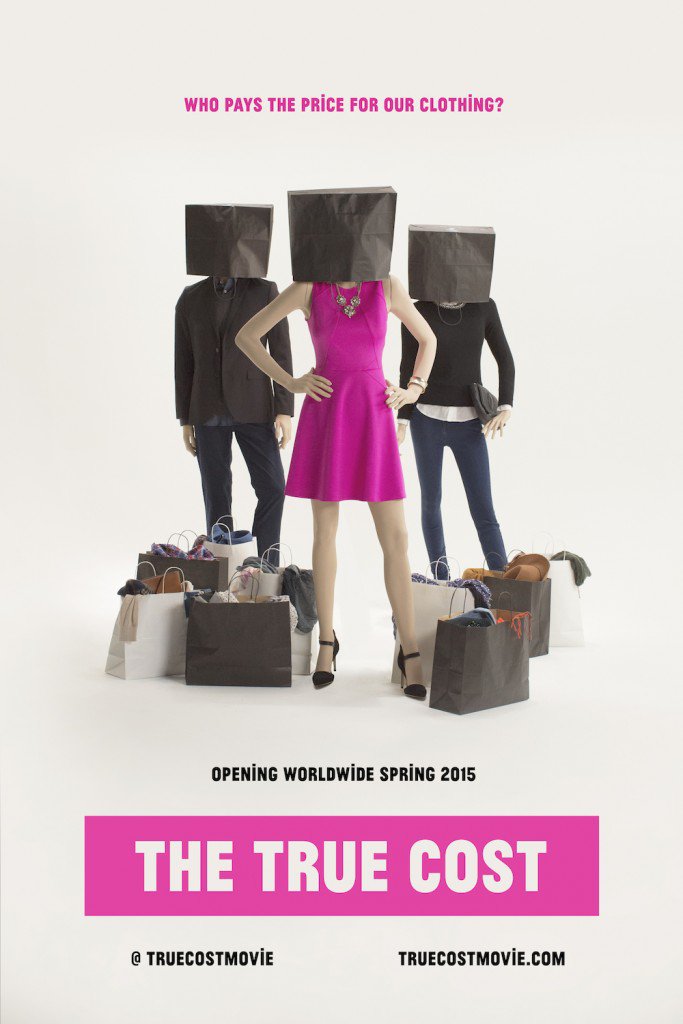Our first brand Red or Dead was nothing if not purposeful, and we have continued to be a voice for ethical fashion.

Last week I attended a screening of the new documentary True Cost and took part in a Guardian Live post-screening panel, chaired by journalist Lucy Siegle, who is one of the film’s executive producers. The panel discussion included the director of the film Andrew Morgan and the words on the website explain what he has delivered;
“The film is a story about clothing. It’s about the clothes we wear, the people who make them, and the impact the industry is having on our world. The price of clothing has been decreasing for decades, while the human and environmental costs have grown dramatically. The True Cost is a ground-breaking documentary film that pulls back the curtain on the untold story and asks us to consider, who really pays the price for our clothing?
Filmed in countries all over the world, from the brightest runways to the darkest slums, and featuring interviews with the world’s leading influences including Stella McCartney, Livia Firth and Vandana Shiva, The True Cost is an unprecedented project that invites us on an eye opening journey around the world and into the lives of the many people and places behind our clothes.”
It’s a sobering watch, I am sure that most of us involved in design understand the damage that is done to communities and the environment in some developing countries in the name of our vanity. We see in the news, and True Cost shows in uncomfortable graphic detail, disasters like the 2013 Rana Plaza factory collapse in Bangladesh where over 1200 died and a further 2500 injured. We occasionally see in the media environmental disasters where rivers are “killed” by dye chemicals and groundwater poisoned resulting in horrific illnesses for the people who rely on these watercourses. True Cost gives us a hefty 90 minutes dose of the ugly reality of often unregulated an uncaring consumerism. But it all seems so far away and on the whole we continue to put “fashion” and what that achieves for us before ethics.
What to do that is tangible:
1. Make sure that this film is shown in all schools and ethical consumption becomes more of our education. We need a new generation of Anita Roddicks coming through the system. What Anita and the early days of The Body Shop did for ethical testing and sourcing of product changed the beauty industry.
2. Aim to reduce obsolescence by making longevity an important criteria in the consumption choice. Can longevity not be sexier than new? Can “fast fashion” not become a dirty phrase? Add longevity categories to design/ product sector awards and promote longevity as being something to strive for.
Rather than allow the likes of Jeremey Clarkson take the piss out Toyota Prius let’s celebrate the fact that they go on for ever (mine has just gone past 230,000 miles and it still drives like a new(ish) car)
3. Could a “kite mark” be developed?
4. Make sure we all subscribe to e shots from the likes of People Tree who led by the indefatigable Safia Minney have crusaded for fair trade with gusto for many a year now but who are reaching the consciousness of only a tiny part of the population.
True Cost really got me thinking.
Would a return to UK manufacturing help the situation? Well it would be good in terms of environmental sustainability, we would be sure that children were not involved in production and of course it would create employment in the UK. But don’t developing countries need employment and shouldn’t we be spreading our wealth but ensuring it is done ethically?
Am I being smug in that I know by almost always wearing second-hand or homemade, by hardly ever buying new clothes (except occasionally undies and socks!), that I am not personally contributing to the True Cost issues? Maybe I am because I am not spreading my wealth to developing countries? This film started to turn my beliefs in this respect upside down.
Government legislation could play a bigger role. I know from our work in the sector that in housing construction legislation set by in the early days of the previous Labour government has led to a tangible and substantial increase in the sustainability and energy efficiency of new builds to the extent that this thinking is now embedded.
But we have just had a general election whereby the UK has elected a government that believes in reduced legislation (the Conservative less red tape mantra), lower taxes, more privatisation and 5 million people voted for a party in Ukip that promote reducing foreign aide. It would seem that we care less about the issues of the developing world.
No one thing is going to solve the issues brought to light in True Cost, it is going to take chipping away which will need some form of legislation, but what we can do is “people power”.
Just look what happened in the 90s with the McLibel case. We work with the company now in the UK and as well as cleaning up at the RSPCA Animal Husbandry Awards, their “people focused” approach to employment and their approach to sustainability and ethical sourcing is to be applauded.
So let’s do what “people power” can do and get out there and be loud and demand to know more about where our textiles and clothing come from and the conditions they are manufactured in and let’s hit even harder, embarrass and boycott stores and brands when we hear about child labour and deaths in factories that they operate in.